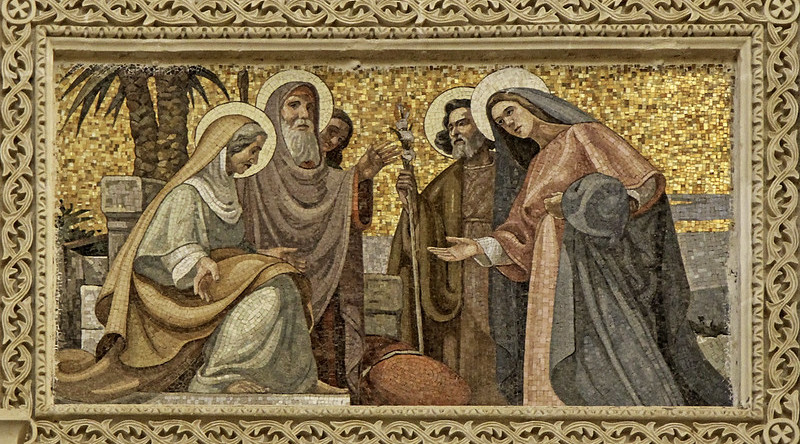No one can predict the path his life will take. God has a plan for each one of us, but few of us get any idea of what it entails until late in life (and even then, only in a dim way). It can be hard to trust God without knowing all the contours of the way he’s taking us. This difficulty is one reason why we’re given so many models of holiness. The multiplicity of saints over the history of the Church, with their variety of stories of conversion, trial, redemption, and flourishing, reminds us: God can also work through someone like you or me. Getting to know the lives of the saints opens our eyes to the variety of paths to holiness that we can take.
The same is true with respect to the men and women of the Bible. These true stories help us to make sense of our own pursuit of holiness (which is, of course, first and foremost God’s pursuit of us). As an example, we can consider just one part of one book of the Bible—the Gospel of Luke, chapter one—and contemplate two individuals: Elizabeth and the Blessed Virgin Mary.
When we encounter her, Elizabeth is, like her husband Zechariah, advanced in years. She has lived a life of faithfulness, but also carries a great sorrow: she is childless. Likely, she and her husband had resigned themselves to this fate many years previously. Elizabeth might have been tempted from time to time to consider her life fruitless. Of course, the message of the angel that they would receive a son brought them great joy. And yet this announcement probably causes a certain amount of trepidation: at their age, could they really raise this child? Nevertheless—after an initially bumpy start on the part of Zechariah—they raise this child and are blessed in him.
Consider next the scene in which we encounter the Blessed Virgin Mary. She is a young woman, betrothed to a man named Joseph, of the house of David. Like her cousin, she has lived faithfully for God over the course of her life—brief as it is when the angel Gabriel is sent to her. She finds great favor in God’s eyes, and his favor includes a task: she is to bear the Son of the Most High. Surely, this was a lot for a young woman—even one endowed with the fullness of grace—to hear. Any fear she felt, however, was assuaged and subsumed by her trust in God and her desire to respond promptly to his call. She wanted nothing more than to be his handmaid.
Mary and Elizabeth both received missions from God: to raise the sons given to them. But their honor differed. Mary bore the Son of God, Elizabeth bore his Forerunner. By worldly standards, they were not suited for the task given them. Mary was too young, Elizabeth too old. And yet, the God who entrusted to them a role in his salvific plan is of course the same God who enabled them to carry out their missions.
Mary and Elizabeth are exemplary: they received special roles in the history of salvation. But they are also exemplars: they show us how to live lives ordered to God and to be ready to respond to his call. They both embraced the basic attitude of living faithfully: Elizabeth for decades, Mary for years. Because of this, they were ready to respond promptly when God asked something special of each of them. Sometimes it can seem like God is throwing a lot at us all at once. Sometimes it can seem like he’s ignored us for years. But we can always trust in his loving providence; he always knows what he is about.
The Christian life is marked by faithfulness—day in, day out, we seek to live lives pleasing to God. And it is also a life of openness: being ready for whatever God calls us to, whether early in life or later in life. The Christian life is rooted in God, who never changes and never stops caring for us. And it also grows in God’s good time—sometimes in small ways, sometimes in spectacular ways.
✠
Photo by Fr. Lawrence Lew, O.P. (used with permission)







